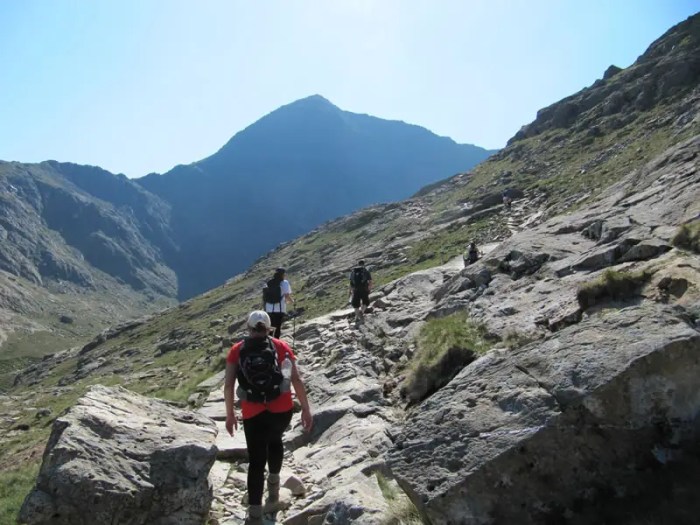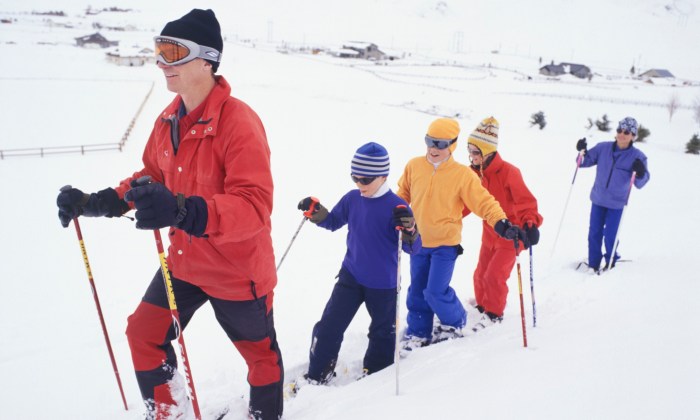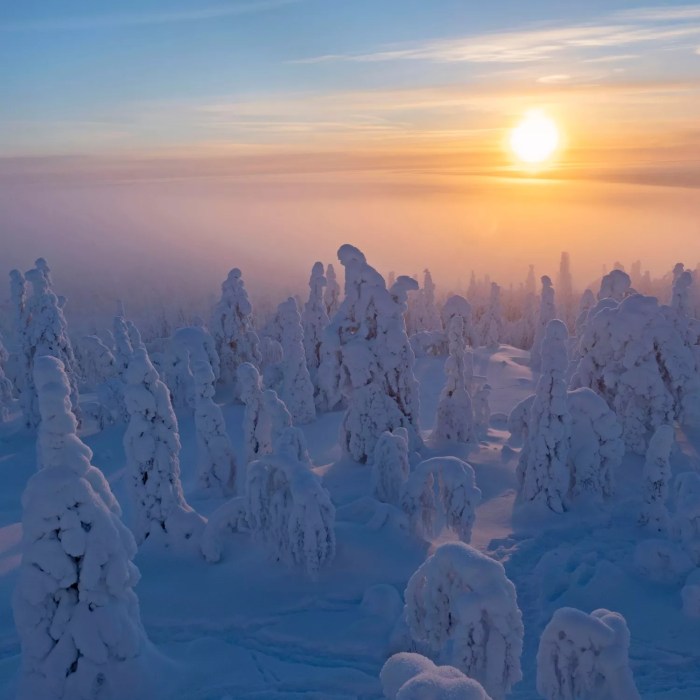
Eco-Friendly Mountain Adventures bring a harmonious blend of nature and sustainability, offering a unique way to explore the great outdoors while preserving its beauty for future generations. Let’s delve into the world of responsible trekking, mountain tours, and wildlife encounters in this captivating journey.
From minimizing environmental impact to supporting local communities, these adventures promise unforgettable experiences while making a positive difference in the world we explore.
Hiking and Trekking
When embarking on hiking and trekking adventures in mountainous regions, it is crucial to prioritize eco-friendly practices to minimize the impact on the environment. By choosing sustainable trails, adopting environmentally conscious behaviors, and utilizing eco-friendly gear, hikers and trekkers can contribute to the preservation of these natural landscapes.
Importance of Choosing Eco-Friendly Trails
- Opt for designated trails: Stick to established paths to avoid damaging fragile ecosystems and wildlife habitats.
- Research trail sustainability: Choose trails that are maintained and managed by organizations committed to conservation efforts.
- Respect wildlife and vegetation: Stay on designated trails, avoid disturbing animals, and refrain from picking plants.
Minimizing Environmental Impact
- Practice Leave No Trace principles: Pack out all trash, minimize campfire impact, and leave natural objects undisturbed.
- Conserve water: Use refillable water bottles and consider portable filtration systems to reduce plastic waste.
- Opt for eco-friendly toiletries: Choose biodegradable soaps and toiletries to minimize water pollution.
Sustainable Gear Options
- Use recycled materials: Look for gear made from recycled materials to reduce the demand for new resources.
- Choose durable products: Invest in high-quality gear that will last longer and reduce the need for frequent replacements.
- Consider second-hand gear: Purchase gently used gear or rent equipment to minimize waste and promote reuse.
Mountain Adventures
Exploring the mountains while maintaining respect for the environment is crucial for sustainable tourism. Eco-friendly practices can be seamlessly integrated into mountain adventure tours to minimize the impact on the delicate ecosystem.
Responsible Tourism Initiatives
Many mountainous areas have implemented responsible tourism initiatives to preserve the natural beauty and biodiversity of the region. Some examples include:
- Waste Management Programs: Encouraging visitors to properly dispose of their waste and recycle whenever possible.
- Local Sourcing: Supporting local businesses by using locally sourced products and services during tours.
- Trail Conservation: Ensuring that hiking trails are well-maintained to prevent erosion and damage to the surrounding vegetation.
Benefits of Supporting Local Communities
By choosing eco-friendly mountain adventures that support local communities, travelers can contribute to the economic development of the region while fostering a deeper connection with the culture and traditions of the area. This can lead to:
- Empowerment of Local Residents: Providing economic opportunities for residents through tourism-related activities.
- Cultural Exchange: Engaging with local communities can enrich the travel experience and promote mutual understanding.
- Preservation of Heritage: Supporting local artisans and cultural practices helps preserve the heritage of the region for future generations.
Safari and Wildlife Tours
Safari and wildlife tours offer unique opportunities to experience nature up close and witness diverse ecosystems and wildlife in their natural habitats. Conservation efforts play a crucial role in ensuring the sustainability of these tours and protecting the delicate balance of ecosystems.
Significance of Conservation Efforts, Eco-Friendly Mountain Adventures
Conservation efforts in safari and wildlife tours are essential to preserve biodiversity, protect endangered species, and maintain the overall health of ecosystems. By supporting conservation initiatives, tour operators and travelers contribute to the long-term survival of wildlife and habitats.
- Conservation efforts help prevent habitat destruction and fragmentation, which are major threats to wildlife survival.
- Protecting wildlife habitats ensures that animals have access to food, water, and shelter, vital for their survival.
- By promoting sustainable practices, such as responsible waste management and reducing carbon footprint, conservation efforts help minimize the impact of tourism on natural environments.
Eco-Friendly Practices for Wildlife Habitat Protection
Implementing eco-friendly practices during safari and wildlife tours is crucial for minimizing negative impacts on wildlife habitats and promoting sustainable tourism.
- Choose tour operators that prioritize wildlife conservation and adhere to ethical guidelines for wildlife interactions.
- Stay on designated trails and respect wildlife viewing distances to avoid disturbing animals in their natural habitats.
- Support local conservation projects and initiatives that focus on protecting wildlife habitats and promoting community involvement in conservation efforts.
Role of Ecotourism in Biodiversity Preservation
Ecotourism plays a significant role in preserving biodiversity in mountainous regions by raising awareness about the importance of conservation and supporting sustainable practices.
- Ecotourism promotes responsible travel practices that prioritize environmental conservation, cultural preservation, and community engagement.
- By providing economic incentives for conservation, ecotourism helps local communities value and protect their natural resources, including wildlife habitats.
- Through education and interpretation programs, ecotourism fosters a deeper understanding of the interconnectedness of ecosystems and the need to preserve biodiversity for future generations.
Extreme Sports Travel
When it comes to extreme sports travel, it is crucial to find ways to enjoy these thrilling activities in a sustainable and eco-friendly manner. By incorporating safety measures and environmental awareness into extreme sports adventures, we can ensure the preservation of natural habitats and the safety of both participants and wildlife.
Importance of Safety Measures and Environmental Awareness
Extreme sports such as rock climbing, skydiving, and white-water rafting can pose significant risks to participants if proper safety measures are not followed. It is essential for individuals engaging in these activities to prioritize safety by using appropriate gear, receiving proper training, and following guidelines set by experienced professionals.
Moreover, environmental awareness plays a vital role in extreme sports travel. By respecting wildlife habitats, minimizing waste, and reducing carbon footprint, adventurers can enjoy their thrilling experiences without causing harm to the environment.
Eco-Conscious Extreme Sports Destinations
- Costa Rica: Known for its eco-friendly initiatives and abundant biodiversity, Costa Rica offers opportunities for eco-conscious extreme sports such as zip-lining through lush rainforests and surfing on pristine beaches.
- New Zealand: With a strong focus on environmental conservation, New Zealand provides adrenaline junkies with sustainable options like bungee jumping over stunning landscapes and exploring geothermal wonders.
- Norway: Home to majestic fjords and dramatic landscapes, Norway promotes eco-friendly extreme sports like skiing in remote wilderness areas and ice climbing on glaciers while respecting the fragile ecosystems.
Scuba Diving Destinations
Scuba diving in mountainous regions offers unique and breathtaking underwater experiences. However, it is crucial to choose eco-friendly dive operators to minimize the impact on the delicate ecosystems.
Importance of Eco-Friendly Dive Operators
- Opt for dive operators that follow sustainable practices such as reef-friendly sunscreen, no-touch policies, and proper waste disposal.
- Support operators who prioritize marine conservation efforts and contribute to local environmental initiatives.
- By choosing eco-friendly operators, you can help preserve the underwater beauty of mountainous lakes and rivers for future generations.
Impact of Climate Change on Underwater Ecosystems
- Climate change poses a threat to underwater ecosystems by causing coral bleaching, ocean acidification, and habitat destruction.
- Sustainable diving practices, such as reducing carbon footprint and supporting reef restoration projects, can help mitigate these impacts.
- It is essential for divers to be aware of the changing conditions of underwater environments and take actions to protect and conserve marine life.
Tips to Reduce Plastic Pollution while Scuba Diving
- Avoid single-use plastics by using reusable water bottles, containers, and bags for your diving gear.
- Participate in underwater clean-up activities to remove plastic debris and other waste from mountainous lakes and rivers.
- Choose dive sites that promote plastic-free initiatives and educate divers on the importance of reducing plastic pollution.
Adventure Travel Blogs
Adventure travel blogs play a crucial role in promoting eco-friendly mountain adventures by inspiring and educating readers on sustainable travel practices. These blogs not only showcase breathtaking destinations but also emphasize the importance of preserving the environment for future generations.
Examples of Inspiring Blog Posts
- One inspiring blog post discusses the impact of single-use plastics on mountain ecosystems and provides tips on reducing plastic waste while hiking.
- Another blog post highlights a group of adventurers who organized a clean-up expedition to remove trash from a popular hiking trail, setting an example for responsible tourism.
- A travel blogger shares their experience staying at an eco-friendly mountain lodge that practices sustainable tourism, promoting the importance of supporting environmentally conscious accommodations.
How Bloggers Influence Readers
Adventure travel bloggers have the power to influence readers to prioritize eco-conscious travel choices by sharing personal stories, tips, and recommendations that align with sustainable practices. By showcasing the beauty of nature and raising awareness about conservation efforts, bloggers can inspire their audience to make more environmentally friendly decisions when planning their own adventures.
Rock Climbing Trips

Rock climbing trips offer a thrilling and challenging experience for adventure enthusiasts. However, it is essential for climbers to be mindful of their environmental impact and take steps to preserve the delicate ecosystems in mountainous rock climbing areas.
Minimizing Environmental Footprint
- Avoid damaging vegetation and wildlife habitats by staying on designated trails and using established climbing routes.
- Pack out all trash and waste, including food scraps and biodegradable items, to keep the climbing areas clean and pristine.
- Use eco-friendly climbing gear made from sustainable materials to reduce environmental impact.
- Respect wildlife by observing from a distance and avoiding disturbing their natural habitat.
Preserving Fragile Ecosystems
- Follow Leave No Trace principles by minimizing campfire impacts, respecting wildlife, and disposing of waste properly.
- Avoid trampling on fragile vegetation, such as mosses and lichens, to protect the mountain ecosystems.
- Stay informed about local conservation efforts and volunteer opportunities to give back to the environment.
Importance of Ethical Climbing Practices
- Respect climbing regulations and guidelines set by land managers to protect the natural environment and ensure sustainable climbing access.
- Avoid disturbing nesting birds and other wildlife during climbing activities to preserve their habitats.
- Practice responsible climbing techniques, such as using removable protection to minimize impact on the rock surface.
Off the Beaten Path Adventures: Eco-Friendly Mountain Adventures
Embarking on off the beaten path eco-friendly mountain adventures offers a unique and immersive experience for those seeking to explore untouched natural landscapes and remote destinations. These adventures provide a sense of discovery and connection with nature that is unparalleled.
The Allure of Off the Beaten Path Eco-Friendly Mountain Adventures
Exploring lesser-known mountain destinations presents a series of challenges and rewards that appeal to adventurous travelers. The allure of these off the beaten path adventures lies in the opportunity to escape the crowds, experience pristine wilderness, and witness breathtaking landscapes that few have laid eyes on.
Challenges and Rewards of Exploring Lesser-Known Mountain Destinations
- Challenge: Limited infrastructure and amenities can make logistics more challenging, requiring careful planning and preparation.
- Challenge: Navigation can be tricky in remote areas without well-defined trails, necessitating advanced outdoor skills.
- Reward: The chance to discover hidden gems and secret spots that offer a sense of exclusivity and authenticity.
- Reward: A deeper connection with nature and wildlife, with opportunities for unique encounters and observations.
Unique Encounters with Wildlife and Nature
Venturing off the beaten path often leads to unexpected and memorable encounters with wildlife and nature. From spotting rare species of birds to stumbling upon hidden waterfalls, these experiences create lasting memories and deepen the appreciation for the natural world.
Winter Sports Travel

Winter sports in mountainous regions offer thrilling experiences, but it’s essential to consider eco-friendly practices to protect the delicate ecosystems. Climate change is impacting winter sports destinations worldwide, emphasizing the need for sustainability and responsible tourism practices. Here are some tips on how to enjoy winter sports while minimizing your environmental footprint:
Impact of Climate Change
Climate change is causing shorter winter seasons, unpredictable snowfall, and melting glaciers, threatening the future of winter sports.
- Support ski resorts and destinations that prioritize sustainability and eco-friendly initiatives to reduce their carbon footprint.
- Choose resorts with efficient snowmaking systems that minimize water and energy consumption.
- Opt for environmentally friendly transportation options to reach winter sports destinations, such as public transportation or carpooling.
Enjoying Winter Sports Responsibly
Responsible winter sports enthusiasts strive to protect mountain ecosystems while having fun in the snow.
- Respect wildlife habitats by staying on designated trails and avoiding off-limit areas to prevent disturbance to local fauna.
- Properly dispose of waste and litter by using designated bins or taking trash with you to maintain the pristine beauty of mountain environments.
- Choose eco-friendly gear made from sustainable materials to reduce the environmental impact of your equipment.
Desert Expeditions
Desert expeditions offer a unique opportunity to explore the stunning landscapes and diverse ecosystems of arid regions. These environments are not only breathtakingly beautiful but also incredibly fragile, requiring careful consideration and respect during any eco-friendly adventure.
Highlighting Desert Ecosystems
Deserts are home to a wide variety of plant and animal species that have adapted to survive in harsh conditions. It is essential to appreciate the resilience and delicate balance of these ecosystems while treading lightly to minimize our impact.
- Take only memories, leave only footprints: Practice Leave No Trace principles to ensure minimal disturbance to the desert environment.
- Stay on designated trails to avoid damaging fragile vegetation and soil crusts that play a crucial role in preventing erosion.
- Observe wildlife from a distance and avoid feeding or approaching animals to prevent disruption to their natural behaviors.
Sustainable Camping and Water Conservation
In desert environments where water is scarce, it is vital to practice sustainable camping techniques and conserve this precious resource to minimize our environmental footprint.
- Use biodegradable soaps and toiletries to reduce water contamination in desert oases or water sources.
- Limit water usage by taking short showers, using water-saving devices, and reusing greywater for non-potable purposes.
- Choose camping sites on durable surfaces like rock or sand to avoid damaging vegetation and soil crusts.
Respecting Desert Wildlife Habitats
Desert wildlife, from elusive reptiles to iconic mammals, play a vital role in these ecosystems, and it is crucial to respect and protect their habitats during expeditions.
- Avoid disturbing nesting sites or burrows of desert animals and birds, especially during breeding seasons.
- Do not collect or remove plants, rocks, or other natural materials from the desert, as they serve as essential resources for wildlife.
- Dispose of waste properly and pack out all trash to ensure it does not harm wildlife or pollute the desert environment.
In a world where every footprint matters, Eco-Friendly Mountain Adventures stand out as a beacon of responsible travel, inviting us to cherish and protect the natural wonders that surround us. Embark on these eco-conscious journeys and leave behind memories that not only thrill but also nurture our planet for years to come.
Essential FAQs
How can I choose eco-friendly trails for hiking and trekking?
To choose eco-friendly trails, look for designated conservation areas, avoid off-trail hiking, and follow Leave No Trace principles.
What are some examples of responsible tourism initiatives in mountainous areas?
Examples include supporting local guides and businesses, participating in community projects, and respecting wildlife habitats.
How does climate change impact winter sports destinations?
Climate change can result in shorter winter seasons, less snowfall, and the need for artificial snowmaking, affecting the sustainability of winter sports.




